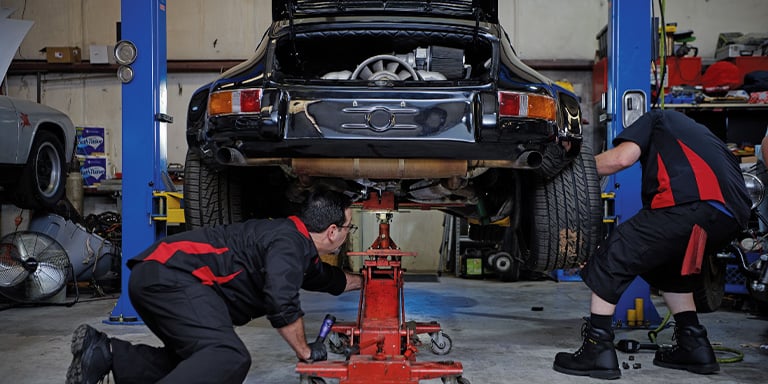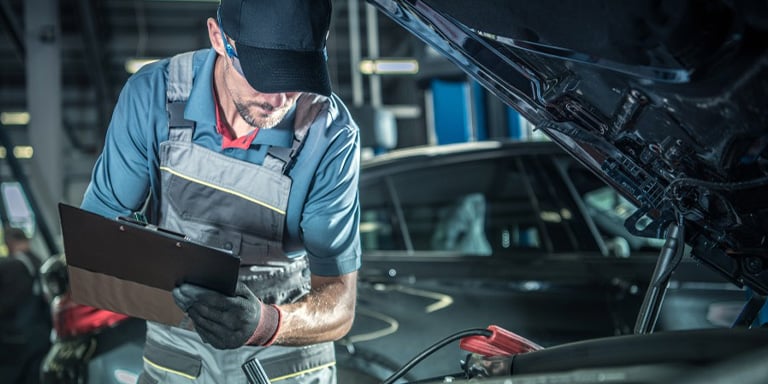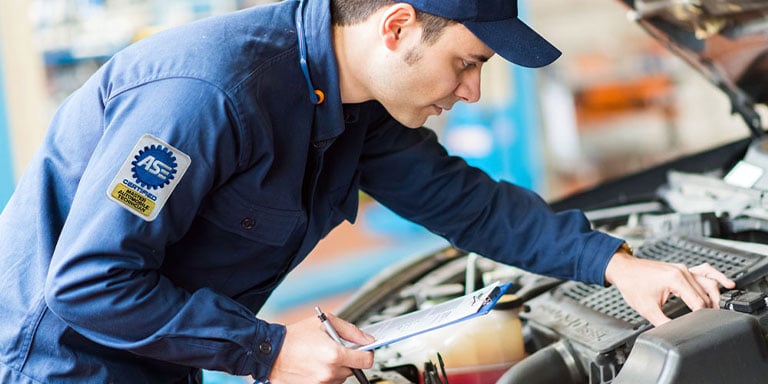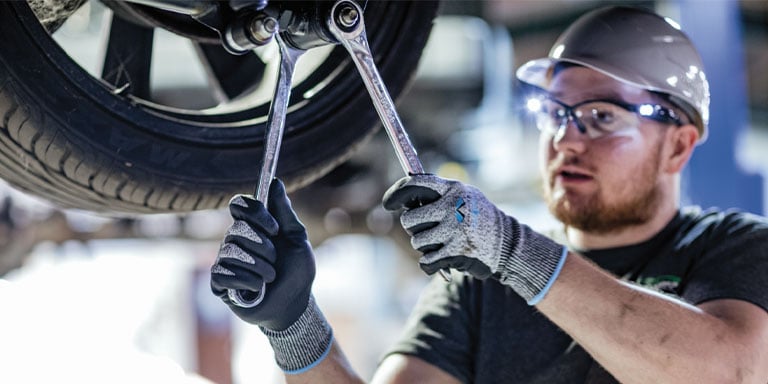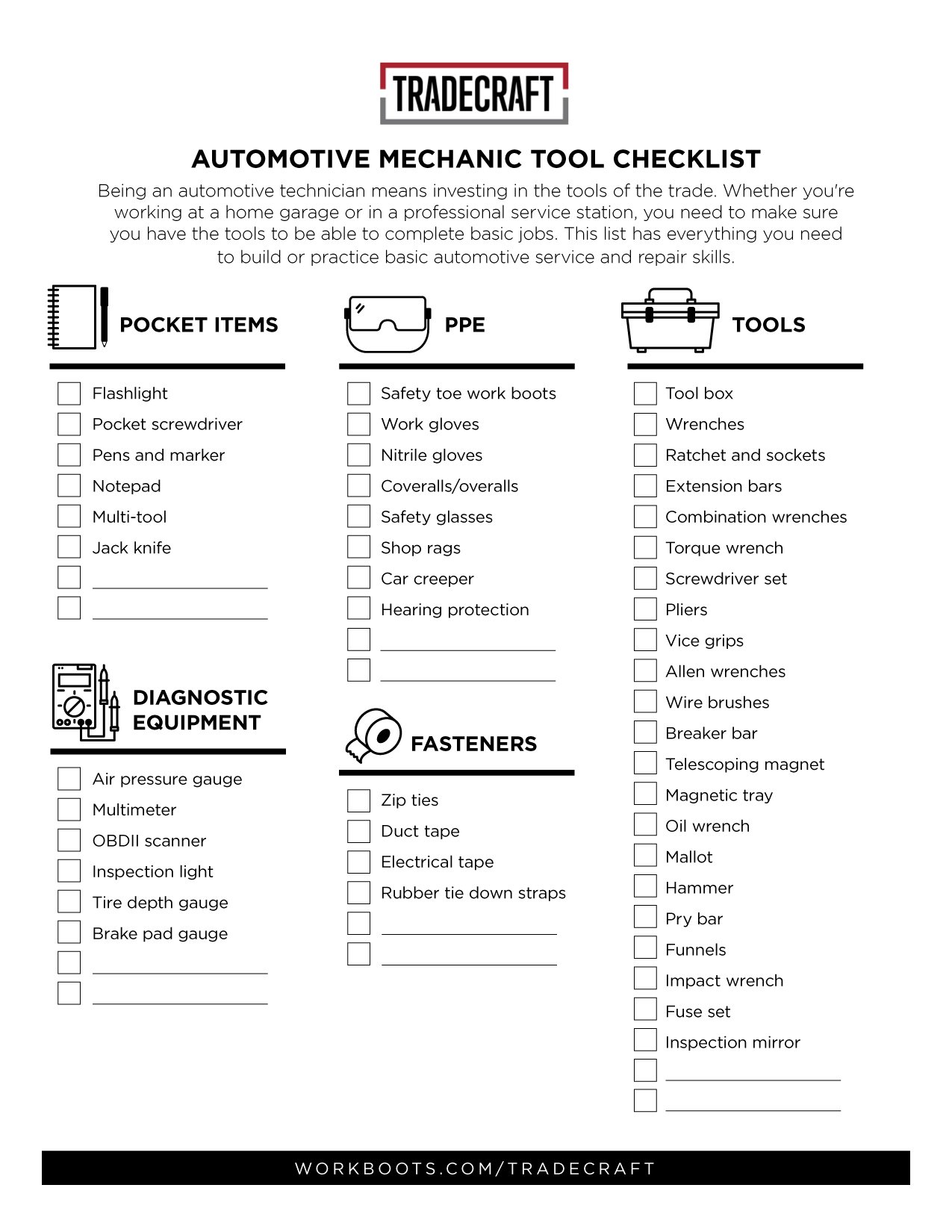
Share:
Pocket Items
We'll start with a few of the basics. These items are lightweight and easy to carry, but having them on hand will make your work day so much easier.
Flashlight: Being able to shine a light in dark spaces will make diagnosing, repairs and general maintenance much simpler. Having quick access to a bright flashlight is crucial for safety and efficiency.
Pocket screwdriver: There are many small rivets that can be pried off and plenty of stubborn containers that can be opened with a simple pocket screwdriver.
Pens and marker: Your job may require you to sign for parts, and you'll definitely have to take diagnostic notes. This means you'll always need a few decent pens on you.
Notepad: If you're just learning the ropes, it's a good idea to write something down when you first learn it. Even if you're a pro, there's still plenty to learn, so keep a notepad handy.
Multi-tool: There will be plenty of times when you'll find yourself wishing you had a pair of pliers in your pocket. Make sure you have a good multi-tool on you.
Pocket knife: Pocket knives are great because they stay securely clipped in your pocket while remaining easy to access. Whether it's for cutting zip ties or opening beef jerky packaging, make sure you have a reliable knife that's easy to access.
Personal Protective Equipment (PPE)
At any good shop, safety comes first. This personal protective equipment will help protect you from common hazards you'll face on the job and help to prevent anything from basic cuts and scrapes to serious, life-threatening injuries.
Safety toe work boots: If you work in an auto shop, then it's important to have proper protection for your feet. This means wearing high-quality safety toe work boots on the shop floor.
Work gloves: Gloves are important for protecting against smashed knuckles and cuts. Whichever gloves you choose, make sure you find a pair that affords as much dexterity as possible.
Nitrile gloves:When jobs require the delicate precision of your bare hands, make sure to maintain a barrier to keep your hands clean.
Coveralls/overalls:Your shop should provide uniforms and cleaning services for them, but you can get extra protection from a pair of coveralls or overalls.
Safety glasses: Eye protection is no joke. You should wear safety glasses whenever you're dealing with fluids, power tools or anything else that might damage one of your most important diagnostic assets.
Shop rags: Cleaning up spills as soon as possible will increase your shop's safety. Rags are useful for many other cleaning tasks.
Car creeper: If you have to work underneath a car without lifting it, then you'll want to roll in and out on a comfortable creeper.
Hearing protection: Whether it's the noise from beading a tire, the boom of combustion gone wrong or the drone of your least-favorite radio station, make sure to have protection from auditory hazards.
General Tools
Any experienced tech will tell you that your biggest investment throughout your career are the tools you'll use every day. Your tools are the most important equipment you have, so it's better to spend a bit more on something that will last longer than to spend conservatively on something that will break after limited use.
Tool box: If you're new to the trade, you may be able to get away with a tool bag that you can bring home with you, or a small locking toolbox — but only at first. Either way, it's important to keep your tools safe and secure. When buying a box, buy bigger than what you need to ensure you'll have room for more tools in the future.
Ratchet and sockets: At a minimum, you'll want a full ⅜” set of standard sockets along with a matching ratchet. If you're not on a strict budget, try to find a set that has ½” and ¼” sockets and ratchets as well. It may also be a good idea to buy a spark plug socket.
Extension bars: Cars and trucks have more than enough tight spaces that you won't be able to ratchet without an extension bar (or 3), so make sure you invest in a ratchet set that includes these.
Combination wrenches: These come in sets of either standard or metric sizes. If you plan on working on a lot of cars, you'll want to have both on hand.
Torque wrench: Applying precisely the right amount of torque is crucial for transmission and engine rebuilds, but you'll want a ½” torque wrench for lug nuts.
Screwdriver set: No toolbox is complete without a set of screwdrivers. It's usually best to buy a set that includes not only phillips and flatheads of varying sizes, but starheads, too.
Pliers: Make sure you get a set that includes needle nose, slip joint, diagonal cutters and combination pliers.
Vice grips: Also called locking pliers, vice grips are great for many things, including keeping a hood up by clamping down on the support arm.
Allen wrenches: Also called hex keys, you'll want some in SAE and metric sizes (get both, since many car screws have hex heads).
Wire brushes: These are great for cleaning the corrosion off of battery terminals, so always keep 2 or 3 in your box.
Breaker bar: Breaking stubborn nuts may require more leverage than your ratchet can provide, so get a breaker bar to increase your power.
Telescoping magnet: At least once in their career, every auto tech will drop a nut, bolt or socket somewhere that is difficult to reach. Getting metal pieces out from where they don't belong is significantly easier with a magnet.
Magnetic tray: Having a place to keep nuts and bolts that you'll need to reuse is much easier with a magnetic tray. These keepers can be stuck to your tool box or even on the vehicle you're servicing.
Oil filter tool: Some oil filters are too stubborn to loosen by hand. Make sure you have oil filter pliers, a strap wrench or a spider wrench to help.
Mallet: A dead-blow mallet is useful for hitting things with dampened force (like when you need to loosen a rotor during a brake job).
Hammer: If you really have to make an impact on a car part, it's important to concentrate the force as much as possible. Be sure to have a ball-peen hammer in your toolbox.
Pry bar: Having a solid set of wrecking or pry bars will give you leverage when negotiating issues like rust and corrosion.
Funnels: Make sure you have different funnels for each type of fluid vehicles need and avoid getting them mixed up so you don't cross contaminate the fluids.
Impact wrench: New auto techs will want to avoid investing too much in power tools early on, but having an impact wrench will increase efficiency and job satisfaction from the get-go.
Fuse set: Many electrical issues can be fixed easily with a simple fuse replacement, so make sure you have a fresh set on hand.
Inspection mirror: Having light is helpful when navigating the dark recesses of a vehicle, and having a mirror can save you from having to contort your arm or remove components just to take a look at something.
Diagnostic Equipment
Before you fix a problem with a vehicle, you need to figure out what the problem is first. These diagnostic tools should help point you in the right direction.
Tire pressure gauge: Old-school analog gages are typically more reliable and accurate than digital ones. Remember to check the driver's side door jam for the recommended PSI of the vehicle's tires.
Multimeter: These tools let you measure resistance, voltage and capacity, allowing you to diagnose and repair electrical issues.
OBD-II scanner: The vehicle's On-Board Diagnostics system gives you diagnostic codes which can help you pin down the source of an issue. In order to get these codes, you need a scanner that can read for them.
Inspection light: When you're involved in a complex project under the hood, it's a good idea to have a long magnetic light stuck above you.
Tire depth gauge: Measuring tire depth is good for knowing when to get new tires. In addition, this tool can help diagnose suspension issues.
Brake pad thickness gauge: Being able to tell customers how much life is left on their brake pads is a big part of securing brake jobs, so make sure you have a gauge on hand.
Fasteners
There's nothing a little bit of duct tape can't fix. When something needs tightening, adhering or fastening, you'll want to have these favorites close by.
Zip ties: Whether they're for joining loose components, securing undercarriage guards or securing a customer's grill after an accident, make sure to have various sizes of zip ties at the ready.
Duct tape: Regardless of your industry, the fact is that every toolbox should contain a healthy roll of this glorious stuff.
Electrical tape: Be sure to have a roll of this tape on hand in case you have to insulate any wires.
Rivets: If you've got a home shop, it's important to have your own push-in rivets on hand to fix bumpers and other minor damage with ease.
Tool Buying Tips
Because tools are such a vital part of an auto tech's arsenal, we decided to round out this list with a few tips on purchasing them. These pointers should help to ensure you get the most bang for your buck so you can build an efficient collection of equipment throughout your career.
Many new technicians should look into used tools and tool sets that contain most things on this list.
Don't spend more than 10% of your income on tools, and never let your debt level exceed $500.
You should only consider buying and leasing high-quality and expensive equipment from tool trucks only after you're fully committed to the trade.
If you are fully committed to the trade, it's wise to buy these high-quality tools for yourself as soon as possible.
Check pawn shops, insurance liquidators, garage sales and any other places that might yield a good deal on used tools.
Increase the amount of tools you own as your skills grow. In other words: don't buy tools until you know how to use them.
Building up an impressive tool collection takes time, so focused on gaining skills before you think about buying tools.
Did you find this article helpful?


